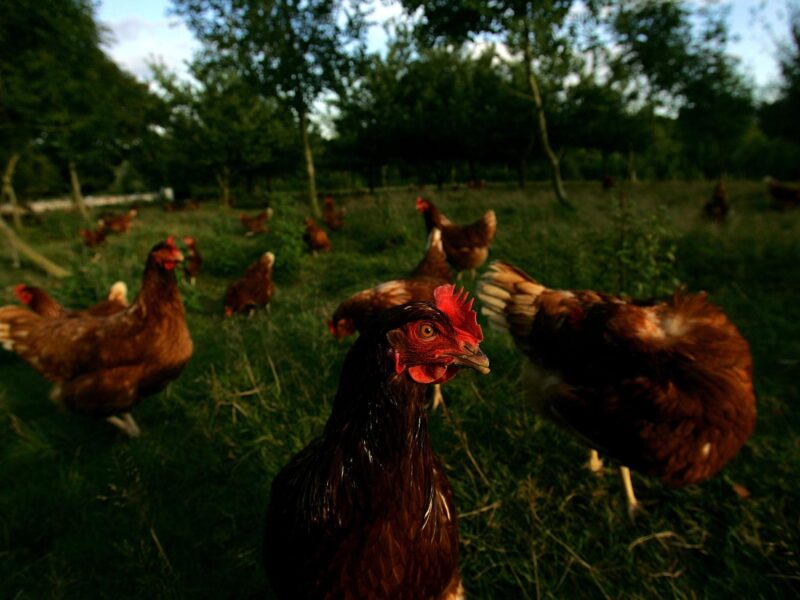
Reasons For Hope
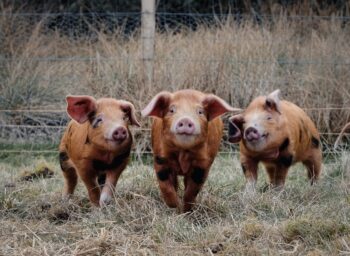
Oxford Sandy and Black piglets from Lynbreck Croft. Winner of the Sustainable Food & Farming Award – small producer category | Credit: Sandra Angers Blondin
One of my greatest pleasures each year is presenting the Good Farm Animal Welfare Awards.
I’m humbled to share that, since our Food Business programme and awards began in 2007, the total number of animals benefitting (including awards, projects and pledges) is over 2.23 billion.
It’s a real achievement and a great endorsement of the positive change that can happen, when we work together to achieve the transformation our food systems so badly need. In the midst of the ‘highs and lows’ that come with our work in animal welfare, it’s a significant ‘high’ and it fills me with great hope for the future, for animal welfare, humankind and our planet.
All the winners at this year’s virtual Good Farm Animal Welfare Awards, held at the end of June, deserve our congratulations for their efforts in taking significant steps to improve the welfare of animals.
The annual awards were streamlined this year due to the COVID-19 pandemic, but it did little to dampen our enthusiasm for those companies who continue to be proactive and committed to achieving higher welfare standards. I’d like to congratulate and thank all of this year’s winners for all they are doing to make life better for millions of farmed animals.
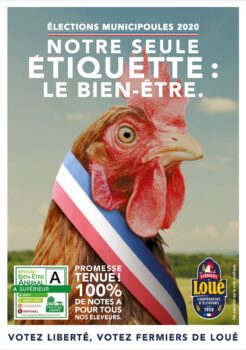
This year’s Best Marketing Award was presented to French, higher welfare poultry producers, Les Fermiers de Loué for their poster linked into the 2020 Municipal Elections that were happening in France at the time
This year’s Best Marketing Award was presented to French, higher welfare poultry producers, Les Fermiers de Loué, for their humorous and eye-catching street poster campaign that cleverly linked into the 2020 Municipal Elections that were happening in France at the time. Entitled ‘Elections Municipoules 2020’ the campaign which took place in Paris and Le Mans mimicked the familiar posters of political candidates, by featuring a chicken as their candidate whose electoral promise was ‘Our only label: welfare’. It successfully raised awareness of Loué’s ‘A’ Rating for animal welfare and did a great job at successfully getting animal welfare onto the wider political agenda.
Of the entries for the Best Innovation Award not one, but two, applications stood out, both of which were awarded Special Recognition Awards. Hilton Seafood UK received its award for being the first to commercially trial and adopt an electric stunner for warm water Whiteleg shrimp and King Prawns. As noted by Dr Tracey Jones, our Director of Food Business at Compassion “The sentience of crustaceans is often overlooked and in the absence of any legislation or standards, this electric stunner for shrimp, has the potential to benefit billions of animals if adopted more widely across the industry.”
The other winner of a Special Recognition Award within the Innovation category was Danone for its global assessment tool for dairy cow welfare. This digital tool, which can be used on any tablet, helps farmers phase out inappropriate practices, such as tail docking and dehorning and creates a SMART Action plan for improvement based on key inputs and welfare outcome measures.
The Planet Friendly Award celebrates companies committing to meaningful meat (dairy, fish, or eggs) reduction targets in their supply. This year, Italian manufacturer Barilla was singled out for a Special Recognition Award. Since committing in 2012 to go cage free on all shell eggs and egg ingredients, Barilla has successfully implemented cage free eggs across its entire global business, which is no mean feat for a company that operates in over 100 countries. They have also reformulated some of their products which has led to a progressive decrease in the use of eggs as ingredients, reducing greenhouse gas emissions and taking over 350,000 hens out of their global supply.
Dr Tracey Jones was impressed “Whilst the transition to higher welfare production systems is imperative, growing scientific evidence calls for a significant reduction in the overall production and consumption of animal protein. Barilla’s work to actively reduce egg consumption with the resulting fall in emissions is an excellent example of how this balance can be successfully achieved and deserves to be recognised”
In this age of pandemic, climate and biodiversity emergency, we know there is an urgent need to move to regenerative, nature-friendly farming. The Sustainable Food & Farming Award is awarded to businesses that are taking steps to produce higher welfare meat, dairy and eggs in ways that protect, improve and restore wildlife and the environment. There are two categories for this award – the small producer or farmer, and the corporate/large food business award.
The winner of the small Producer category was Lynbreck Croft, a multi-enterprise food producing business that is firmly rooted in farming with nature and high animal welfare principles. Owners Lynn Cassells and Sandra Baer now produce a diverse range of food from eggs to pork, beef to honey, as well as added value meats and charcuterie. Recognising that land and animals are our most valuable and essential assets, Lynn and Sandra use regenerative grazing principles, prioritising soil health with a goal to increase biodiversity. They have planted 30,000 native trees and choose animals that are suited to the UK climate and natural forage.
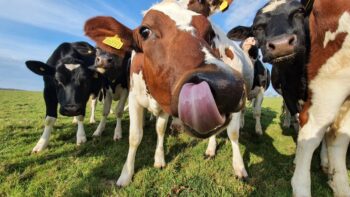
Hollis Mead is an organic farm whose ethos is to produce high quality organic milk and food whilst at the same time enhancing the environment for wildlife | Credit: Hollis Mead
This year, Compassion also presented a Special Recognition Award in this category to Hollis Mead Organic Dairy – an organic farm specialising in high quality organic milk and food sold directly to the public ‘while enhancing the environment for wildlife’. Based in Dorset, Hollis Mead’s organic herd of British Friesian crosses are grass fed on organic pastures and only milked once a day with their milk sold via 14 vending machines across Dorset, Devon and Somerset. Having planted over 15 miles of hedges over the years, wildlife is flourishing, and soil health has also improved dramatically on the farm.
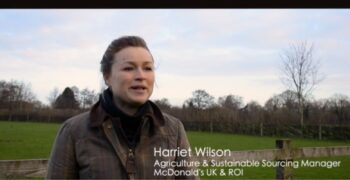
Harriet Wilson, Agriculture and Sustainable Sourcing Manager, McDonald’s UK and ROI explains why McDonald’s rely on over 23,000 British and Irish farmers to supply the highest quality food and why McDonald’s has one of the greatest opportunities due to their extensive grazing based system, to address climate change and drive positive change in sustainable food production.
The Corporate category of the Sustainable Food & Farming Award celebrates companies that can make positive change on a large scale, both to the animals in their supply and to the wider environment. This year McDonald’s UK & Ireland was the worthy winner of the corporate award for their Regenerative Beef Project, which aims to demonstrate the benefits (environmental, ethical and economic) of an Adaptive Multi-Paddock (AMP) grazing approach, with the ultimate goal of developing a roadmap towards a commercial regenerative beef farming system.
Last but not least, despite the slimming down of this year’s Good Farm Animal Welfare Awards, there were three additional species awards presented. Chinese producer Happy Eggs received the very first Good Egg Award in China for selling only cage-free eggs on the internet. They lease the higher welfare and environmentally friendly Dutch ‘Rondeel’ barn system – the only one in China – and have built an additional aviary barn system which is set to improve the lives of more than 240,000 hens each year. In addition, they are keen to educate the public about the benefits of higher welfare for animals and humans alike and are building a small museum and café linking welfare farming to the local tourist industry.
Leading Italian producer of healthy bakery treats, Galbusera, completed its transition to cage-free eggs across all its own brands in 2020. The company received a Good Egg Award this year for extending its cage-free commitment to exclude combination systems within the next five years.
Nature d’Eleveurs, owned by leading French manufacturer LDC group, received a Good Rabbit Commendation for its commitment to roll out higher welfare, cage-free production for fattening rabbits in all farms producing rabbit meat under this brand.
This year the United Nations Food Systems Summit in September will convene as part of the Decade of Action to achieve the Sustainable Development Goals (SDGs) by 2030. The Pre-Summit takes place on 26th-28th July and will be encouraging us all to work together to transform the way the world produces, consumes and thinks about food. It has never been more important and I sincerely hope that you will also support these worthy winners, perhaps by visiting their websites, trying their produce but certainly in recognising their efforts and remembering their brands.
Thank you.
If you wish to watch the highlights of the Good Food & Farming Awards please use this link https://www.youtube.com/watch?v=uhgODzWSdOo
Please Note: On Tuesday 27th July at 13:30 (CEST), a special UN Food Systems Session is being held as a parallel event to the major UN Food Systems Pre-Summit. It is organised by Compassion in World Farming and co-hosted by Action for Animal Health, the International Cooperation Committee on Animal Welfare (ICCAW), One Welfare, and the World Federation for Animals (WFA) . The subject is ‘One Health, One Welfare – Food Systems Opportunities for Better Human, Animal and Ecological Well-being’ and there are some excellent speakers.
Here is the registration page and further info: https://us02web.zoom.us/webinar/register/WN_XVXQuKBWSqKuAwJ_OhNQ7w. It promises to be a really interesting and insightful event, and I do hope that you will be able to join us.


